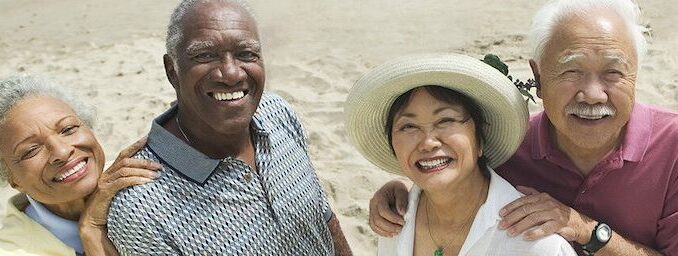
By Stacy M. Brown – September 9, 2020 – Experts believe the number of older adults in the U.S. will reach nearly 71 million by 2030.And according to data compiled by AARP, this expanding older adult population will significantly affect the nation’s public health system and increase the demand for aging-related services.
September counts as National Healthy Aging Month, a time of the year during which greater attention is given to the lives and contributions of seniors as well as the health challenges they face.
“Spend time with elderly people or call your local nursing home and ask if there’s something you can do to support their residents as they deal with COVID-19,” said Aaron Blight, founder of Caregiving Kinetics and the author of the upcoming book, “When Caregiving Calls: Guidance as You Care for a Parent, Spouse, or Aging Relative.”

“Challenge cultural assumptions about aging or oldness. Rethink what retirement actually means, hire an older worker and write a letter to an elderly person who has been confined to their home during COVID-19,” Blight suggested.
Jim Owen, a 79-year-old fitness enthusiast and the author and producer of “The Art of Aging Well,” airing this fall on PBS, says if we’ve learned anything from the pandemic, it’s that the people most vulnerable are those with underlying health conditions.
“We know that these chronic diseases are, to some degree, lifestyle-related, so if you smoke, or are obese, or live a sedentary way of life, you are at higher risk of getting seriously ill or dying from the virus,” Owen noted.
“The best way I’ve found to [improve your health] is to focus on one healthy habit at a time – say, going for a walk every day – and challenging yourself to keep it up for 30 days. Then, make another small change. If you do that every month, imagine where you could be a year from now,” he said.
Stephanie Erickson, a clinical social worker and author of the book, “Plan for Aging Well,” says the focus needs to center on a complete rebuild of the nation’s medical and healthcare system so older adults can receive care and support for “their body, mind and soul.”
“Our current model is intervention and medically based and should include a balanced approach to provide opportunities for our emotional, psychological and spiritual wellbeing,” Erickson said.
“Aging is scary for people and conversations about it are avoided, leaving older adults alone and without a clear plan of their expectations in terms of care and support as they age,” she said. “This creates unavoidable crises and family conflict.”
“This pandemic has highlighted, very clearly, how little we support those who are aging. It is now time to rebuild the system completely,” Erickson added.
Writer and educator Kathie Lapcevic believes older adults should focus on simplifying their lives.
“It’s a good idea to avoid all the crazy distractions which often lead people feeling overwhelmed as they try to do it all and to be all for everyone,” Lapcevic said. “Take time to live a life that is slower and more intentional with a focus on personal priorities, not those that are applied from social media or marketing.”
For more information about older adults and National Healthy Aging Month, visit www.aarp.org or www.healthyaging.net.

Be the first to comment